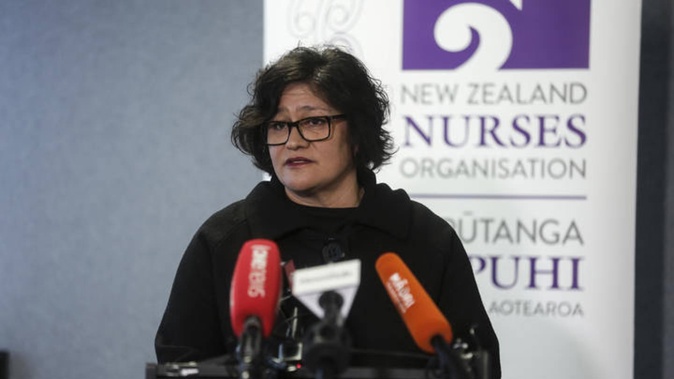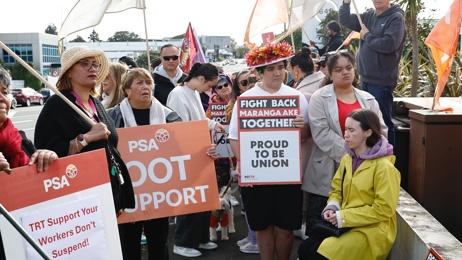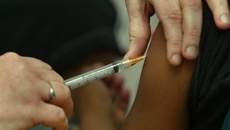
By Rowan Quinn of RNZ
Doctors are giving Te Whatu Ora a fail mark for its first year, but say it is showing glimmers of promise.
Saturday marks a year since the 20 district health boards were abolished and replaced with Te Whatu Ora in a move to help end big differences in care depending on where people live.
It was now the biggest employer in the country with 220,000 staff, but many of them said it needed to do better.
Association of Salaried Medical Specialists executive director Sarah Dalton said the union was giving Te Whatu Ora two out of five so far.
/cloudfront-ap-southeast-2.images.arcpublishing.com/nzme/U6I33FS7EVHZHMCQDOLTFKS3BY.jpg)
Association of Salaried Medical Specialists executive director Sarah Dalton. Photo / Nick Monro, RNZ
“Could do better, needs to do better, not good enough.”
Te Whatu Ora should have hit the ground running last July, getting straight to work on one of its biggest problems - massive staff shortages - but it had taken too long, she said.
Te Whatu Ora’s former chair Rob Campbell said the organisation missed the opportunity to get staff onside early on by actions like settling long-running pay disputes straight away.
/cloudfront-ap-southeast-2.images.arcpublishing.com/nzme/ZQ2UNDYREY3PZH3WXX35DODGVM.jpg)
Former Te Whatu Ora chair Rob Campbell says scheduled surgery is one area where people should expect results fairly quickly. Photo / Michael Craig, File
“You have to have the people onside with you. If you haven’t got that you won’t ever succeed,” he said.
He admitted he was partly to blame - he was one of the leaders until February when he was sacked for criticising the National Party, breaching neutrality rules.
The organisation was too bogged down in its old bureaucracies when it should be doing things differently, he said.
“You’ve got to focus on the things that make a difference to people on the job and not pander to what the minister wants, or what sort of announcements they might think are necessary.”
It was never going to be easy - taking 20 big, complex organisations, and making them into one enormous one.
There are task forces to try to sort out poor immunisation rates, staffing shortages and long waiting lists.
Those spoken to by RNZ said they had seen little to suggest any major change in the postcode lottery of care - different waits and services depending on where people lived - but they could see some areas starting to work together more.
Publicly available data to measure change stalled in December last year, but the trends until then showed waiting lists for specialist appointments and surgery growing.
The College of Surgeons chair Andrew MacCormick said Te Whatu Ora’s work was starting to make a dent for those waiting the longest for an operation - more than a year - but there was a long way to go for everyone else.
Te Whatu Ora had inherited a lot of problems - workforce shortages, staff burnout and inadequate infrastructure, he said.
“They’re not going to be solved overnight. While the ideals are laudable, it’s taking a while to see action.”
Nurses’ Organisation kaiwhakahaere Kerri Nuku said the union supported the reforms and understood change was never going to be immediate. But there was not explicit support for nurses given the pressure they were under.
/cloudfront-ap-southeast-2.images.arcpublishing.com/nzme/NDJFRCAIEMKLCEEH2IE5NY4NEQ.jpg)
New Zealand Nurses Organisation kaiwhakahaere Kerri Nuku.
“The system is not responsive to nurses and that is a critical challenge that needs to be addressed.”
Australasian College for Emergency Medicine New Zealand chair Kate Allan said her colleagues liked the push towards better equity and focus on fixing workforce shortages.
But it had not yet translated to improvements on the ground, and emergency departments were still lacking skilled staff, she said.
In a statement, Te Whatu Ora chief executive Fepulea’i Margie Apa said the organisation shared the aspirations of workers for an equitable health system that was “sustainably staffed”.
/cloudfront-ap-southeast-2.images.arcpublishing.com/nzme/GBMNTRLEZNCWHAU4OGKFSJLPPQ.jpg)
Te Whatu Ora chief executive Fepulea'i Margie Apa. Photo / Samuel Rillstone, RNZ
There was no quick fix for staff shortages, but Te Whatu Ora was doing what it could - including moves to streamline recruitment of overseas staff and making it easier for nurses to return to practice, she said.
There were six working groups in partnership with Te Aka Whai Ora, the Māori Health Authority, that were focused on developing, recruiting and retaining staff in different careers.
Take your Radio, Podcasts and Music with you









